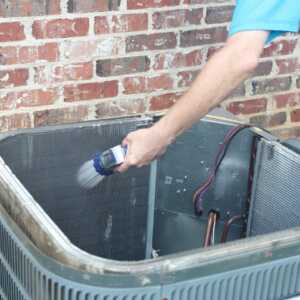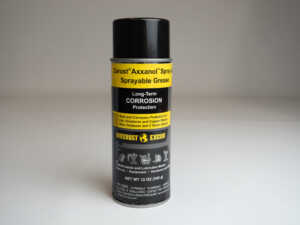Air Conditioner Rust Prevention: Extend Your Unit’s Lifespan With Zerust

Air Conditioner Rust Prevention: Extend Your Unit’s Lifespan With Zerust
Has your AC been working overtime to keep you and your family cool in the summer heat? With summer season wrapping up, now is a great time to address preventative maintenance on your air conditioner, which plays a crucial role in keeping your home cool and comfortable. Over time, rust and corrosion can develop on the outdoor unit, compromising its efficiency and lifespan. Rust forms due to exposure to moisture, which can lead to costly repairs or even the need for replacement. Prevent air conditioner rust and keep your AC running smoothly for years with preventative measures. Zerust can help.
Prevent Air Conditioner Rust With Proper Cleaning
Keeping your air conditioner clean is the first step in preventing rust. Dirt and debris can trap moisture, which accelerates the corrosion process.
- Clean the coils and fins: Use a soft brush or vacuum to gently remove debris from the coils and fins. Make sure to turn off the unit before cleaning. According to Carrier, a leading air conditioner manufacturer, dirty coils can lead to increased operating temperatures, decreased efficiency, increased operating costs, and increased system wear leading to eventual replacement.
- Rinse the outdoor unit: Using a garden hose, spray the outdoor condenser unit to wash away dirt, dust, and leaves. Do not use a high-pressure washer, as this can damage the components.
- Use a leaf blower to clear debris around the unit: Ensure there’s a clear space around the AC unit, free from leaves, grass, or twigs that can hold moisture and promote rust.

Apply Anti-Rust Coating
A protective coating can be applied to the metal components of the outdoor unit to prevent rust from forming. This creates a barrier that blocks moisture from directly contacting the metal.
- Protect bare metal: Metal that is uncoated is more prone to rust. Enamel spray paint can help to prevent rust, but be sure to remove and clean parts before spraying, and do this in a well ventilated area using appropriate protective gear.
- Rust inhibitor spray: Apply a rust-preventive spray such as Zerust Axxanol™ Spray-G to the metal surfaces of the AC. Focus on areas prone to rusting, such as the frame and coils.
- Coil coating: There are specialized coil coatings available that help protect the fins and coils from rust and corrosion. These can be applied by professionals during regular AC maintenance.
Keep the Unit Dry
Moisture is the primary cause of rust, so reducing exposure to water is key to rust prevention.
- Ensure proper drainage: Make sure the unit’s drainage system is functioning correctly to prevent water from pooling around or inside the AC unit.
- Check for standing water: Inspect the area around the outdoor unit and ensure water doesn’t accumulate. If necessary, place the unit on an elevated platform to prevent water exposure during rain or storms.
- Tilt the unit: Slightly tilt the unit to allow rainwater or condensation to drain off easily rather than pooling at the base.
Use a Weather-Resistant Cover
When not in use, especially during the off-season, covering the air conditioner can help prevent moisture and debris from getting inside. This is controversial, with some saying that it is not necessary to cover the AC unit due to it’s inherent durability. However, some protection against excessive moisture during periods of heavy snow or snow melt can be helpful.
- Breathable AC cover: Use a weather-resistant, breathable cover that allows air circulation while keeping moisture and debris out. Avoid plastic covers, as they can trap moisture and lead to rust. Zerust offers a breathable AC cover with built in VCI Protection.
- Seasonal covering: Consider covering the unit during fall and winter when it’s not in use to protect it from rain, snow, and ice. Remove the cover before using the AC to avoid restricting airflow.
Perform Regular Maintenance
Regular maintenance by a professional HVAC technician can help catch potential rust issues before they become serious.
- Inspect for early signs of rust: A technician can inspect for any signs of rust formation during routine maintenance and address them immediately.
- Lubricate moving parts: Ensuring that moving parts like fan motors and bearings are lubricated can help reduce friction and wear, which can also contribute to rust.
- Clean the evaporator coil: Rust can form inside the unit as well. Have the technician check and clean the evaporator coil to prevent internal corrosion.
Replace Rusted Hardware
- The screws, bolts, and other hardware on your AC unit are often the first to show signs of rust.
- If you notice any screws or bolts that have already rusted, replace them with rust-resistant options like stainless steel.
Install a Shield or Awning
Installing a protective shield or awning over the outdoor AC unit can help protect it from direct exposure to the elements.
- Protection from rain and snow: A simple awning or shield can keep rain, snow, and even direct sunlight off the unit, reducing moisture exposure and the risk of rust.
- Ensure proper ventilation: If installing a cover or shield, make sure there is enough space for proper airflow around the unit. Restricted airflow can cause the unit to overheat and reduce its efficiency.
Monitor for Leaks
Leaking refrigerant or water can accelerate rust formation, especially if it comes into contact with metal components.
- Check for leaks: Regularly inspect the unit for signs of refrigerant or water leaks. If you notice any leaks, have them repaired by a technician as soon as possible to prevent rust from developing.
Use Corrosion-Resistant Materials
If air conditioner rust is a recurring issue or if you live in a coastal area where salt air can accelerate corrosion, consider upgrading to an air conditioner with corrosion-resistant materials.
- Coastal units: Units designed for coastal environments often come with specially treated or corrosion-resistant parts, which can last longer in harsh conditions.
- Aluminum or coated coils: Some units come with aluminum coils or specially coated coils that are more resistant to rust than traditional copper coils.
Rust prevention is essential for maintaining the efficiency and longevity of your air conditioner. By keeping the unit clean, dry, and properly maintained, you can prevent rust from forming and avoid costly repairs or replacements. Regular inspections and proactive measures like using protective coatings, covers, and proper ventilation will ensure your AC runs smoothly for years to come.
*************@************ts.com“>Contact Zerust for information on VCI products to help with air conditioner rust prevention by emailing us or calling (330) 405-1965.
Additional Resources:
How To Clean AC Coils, n.d., Carrier Air Conditioner Maintenance
More Blog Entries:
Air Conditioner Covers Protect Your HVAC System in Cooler Months, Feb 27, 2018, Zerust Products Blog


